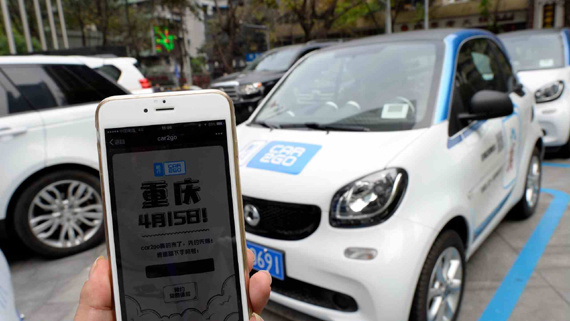
New energy vehicle-share projects are being carried out in dozens of cities across China. (Photo/CGTN)
Shared-bicycle schemes have been mushrooming in cities across China since last year, helping millions of people solve the "last mile problem" in their daily commute. Now, new energy vehicle-share projects are being carried out in dozens of cities across the country, such as Beijing, Shanghai, Chengdu and Shenzhen. The new type of service is expected to fuel China's sharing economy in the next few years.
To use the apps that give you access to this service, users are required to submit their ID information, a photo of their driving license, and put aside a certain amount of money as a deposit, which varies from app to app and can be as much as 1800 yuan (about 260 U.S. dollars). Similar to renting a bicycle, you can simply start off a journey by scanning the car's QR code to unlock it, with the ignition key just inside the car. Charged by time or mileage, the cost could be 50-60 percent cheaper than taking a cab.
The apps are designed to facilitate non-car owners and provide easy access to vehicles, but in reality, it is hard to find an available car. Such apps have been around for two years, but are yet to take off in the same way as bicycle-sharing schemes. Insiders say that high costs, limits on available car registration plates and other restrictive policies have prevented new energy car share schemes from finding success. For example, the cost of a bicycle is around 1600 yuan (about 230 U.S. dollars), making them affordable in large quantities. Shared cars are different, with the cars expensive to buy, and additional costs such as parking, electricity and maintenance hitting profit margins.
For such apps to become a hit in cities across China, it is essential that companies have a large network which can provide enough cars and parking spaces to users nearby. Last year, only 2,000 new-energy licenses were issued for operation in Beijing, far below market demand. At the same time, companies also face the thorny issue of installing charging facilities, especially in busy city streets. At the moment, workers for the app have to drive all cars to designated posts for charging at night.
Despite these difficulties, Wang Yang, founder and CEO of Yidu, a car-sharing app launched in July 2015, remains optimistic about the future. He said a number of cities across China have implemented restrictions on driving and purchasing vehicles, and as costs rise and parking spaces get fewer and fewer, the potential of car-sharing services is huge.
The sharing economy is thriving in China thanks to the wide use of the Internet, mobile phones and innovative technology in the country. As China's economy looks to quickly transform from having a heavy reliance on industry to focusing on its service sector, the sharing economy is expected to be worth 10 percent of China's total GDP by 2020, according to China's National Information Center.


















































